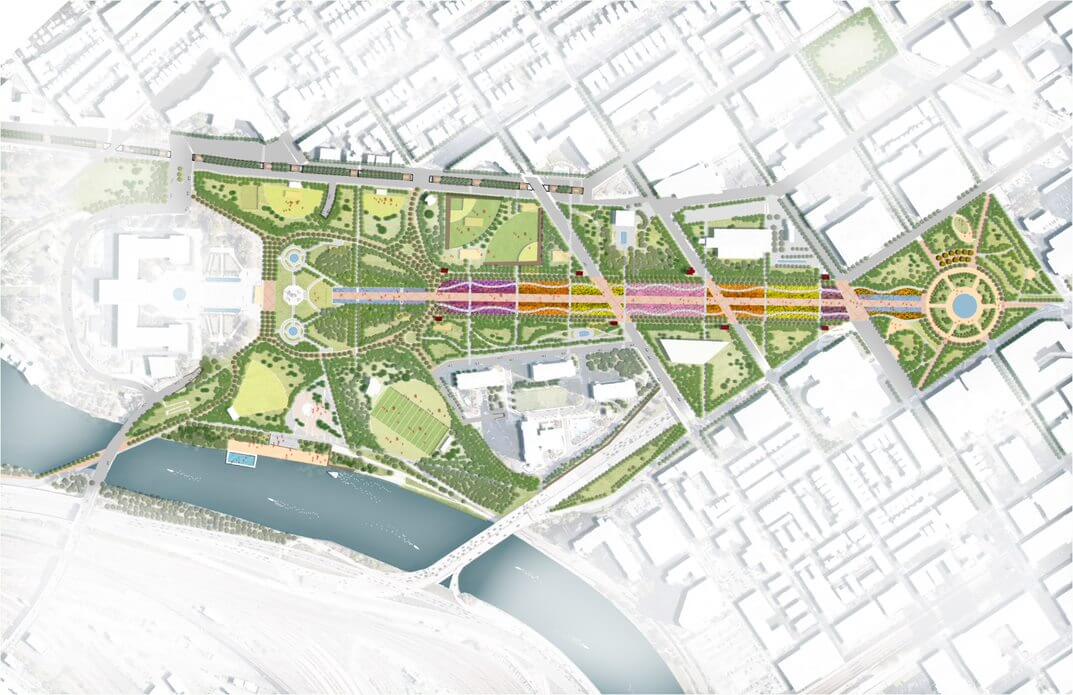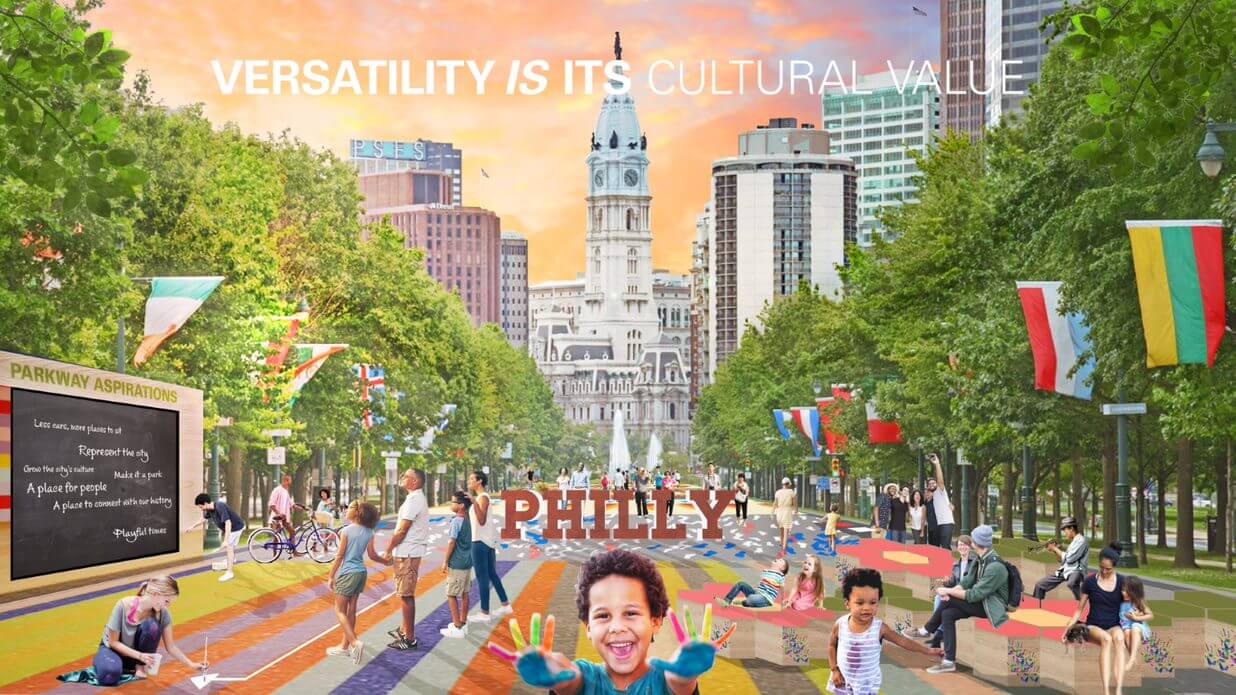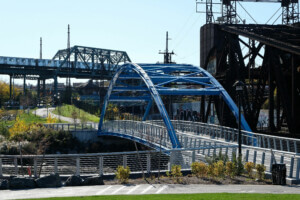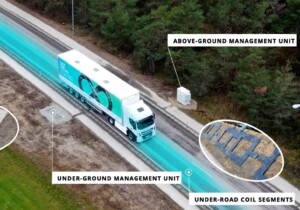Design Workshop, a landscape architecture, planning, and urban design firm with eight studios across the United States, has been selected by the City of Philadelphia to lead a car-lite reimagining of the city’s Benjamin Franklin Parkway.
“The resulting plan for the future revitalization of the Benjamin Franklin Parkway will be based on innovative people-centric design ideas and creative approaches to transportation, economic development, and stormwater management along with phased implementation,” the city explained in a news release announcing its selection.
Albeit relatively abbreviated at just one mile long, the fabled boulevard is arguably Philadelphia’s most famous street. Serving as the central artery of the city’s cultural core, the parkway cuts diagonally across the northwest quadrant of Center City to link Philadelphia City Hall with the Philadelphia Museum of Art. Design Workshop, will work in close coordination with a sub-consultant team and alongside both the Philadelphia Office of Transportation, Infrastructure and Sustainability (OTIS), and Philadelphia Parks and Recreation. The firm was selected from a pool of 18 competitors to lead the design and engagement effort for a revamped Ben Franklin Parkway via a request for proposal (RFP) process. (MVRDV and DLANDStudio with DIGSAU joined Design Workshop as finalists.)

That process was led by the Lindy Institute for Urban Innovation at Drexel University on behalf of the city, and in collaboration with the Parkway Council, a coalition of the many cultural and educational institutions and businesses that line the storied strip. Emerging from this initial design and engagement process, estimated to span between 12 and 18 months, will be cost estimates, a recommended project implementation timeline, and a schematic design, according to the city.
“We are honored to be a part of this iconic project,” said Kurt Culbertson, CEO and chair of Design Workshop, in a statement, noting that the team “will collaborate with the people of Philadelphia to co-create an equitable and inclusive parkway for the future.”
While the larger project team is markedly international in flavor and includes Milan-headquartered Mobility in Chain and the Paris-based PCA- STREAM, an architectural practice working on the pedestrian-centric redesign of the Champs-Élysées, a slew of firms with a local presence are also prominently represented among the sub-consultants. That includes Ground Reconsidered, Kimley-Horn, CH Planning, Meliora Design, and Dharam Consulting among them, with Traffic Calmer, ETM Associates, and The Cultural Landscape Foundation rounding out the team.
“The team selected to carry out this work is as bold, spectacular, and rooted in local pride as the Parkway itself, “said Philadelphia Mayor Jim Kenney. “I encourage Philadelphia residents to join in on this journey to reimagine what is possible on the Parkway through the lens of the Design Workshop’s talented team of public space experts.”
(Design Workshop, which has executed major urban design and open space projects both domestic and abroad, was founded in 1969 in North Carolina and, in addition to its Raleigh office, maintains studios in Chicago, Los Angeles, Denver, Houston, Austin, Aspen, and Lake Tahoe in Nevada.)

“The Design Workshop team gets it, and gets us,” added Philadelphia Parks & Recreation Commissioner Kathryn Ott Lovell in the city’s announcement. “They understand the significance this grand boulevard plays in defining the heritage, culture, and tourism of our City. We are excited to begin redefining who we are and what we value by designing a more vibrant, inclusive, and pedestrian-friendly Parkway that prioritizes people and parks over cars and concrete.”
The Ben Franklin Parkway, designed in 1917 by French landscape architect Jacques Gréber to emulate the Champs-Élysées, has lost a considerable bit of its “park” over its century-plus existence. It is still very much an iconic, scenic boulevard leading to the green expanse of Fairmont Park but one that has been dominated by vehicular traffic over the past 50-some years. The ultimate goal, as mentioned by Ott Lovell, is to render the parkway safer and more attractive to pedestrians and cyclists through a variety of public space improvements. As detailed by the Philadelphia Tribune, Design Workshop proposed a variety of traffic-calming, pedestrian-enhancing ideas at a workshop held this summer alongside the two other finalist teams. Among other elements, ideas included severing the parkway from nearby interstates, capping I-676, widening an existing tunnel under Eakins Oval, and transforming Logan Circle from a traffic-clogged roundabout back into a lively public square. While these specific ideas won’t necessarily be included in the forthcoming plan, the vision presented by Design Workshop over the summer resonated with the city. Specifically, the city noted the firm’s emphasis on inclusive design, forming connections between people and places, and iterative, realistic approach as standing apart.
The boundaries of the project are 20th Street at the southeast to the steps of the Philadelphia Art Museum to the northwest and bordered by Winter Street on the south and Pennsylvania Avenue to the north.
It’s worth noting that the City of Brotherly Love’s efforts to revamp Ben Franklin Parkway aren’t entirely new. The now-underway design/engagement project funded by the William Penn Foundation stems from the 2013 “More Park, Less Way” initiative developed for the city by PennPraxis at the University of Pennsylvania’s Stuart Weitzman School of Design. In lieu of establishing a long-term reimagining of the parkway that could potentially take years to realize, the plan focused on quick-to-implement yet impactful fixes that would have a more immediate benefit for the roughly 70,000 Philadelphia residents living within a 10-minute walk of the parkway while a larger redesign took form. Eight years later, a community-driven plan for that larger transformation will soon materialize.
“Throughout history, the Parkway has served as a critical civic space for everything from peaceful demonstrations and protests to a place of inspiration, celebration, and recreation,” Emily McCoy, principal with Design Workshop, told AN. “As we look to Philadelphia’s 250–year anniversary and after the recent challenges of COVID-19, rising awareness of social injustices, climate change and increasing disparities of wealth, we see this project as an extraordinary opportunity to reframe the role of the public realm in a 21st century, modern city that not only looks to creative solutions to design itself, but in how design strategies are crafted with communities through a robust engagement process.”
AN will check back in with the pedestrian-championing reimagining of the Benjamin Franklin Parkway as the design and engagement project evolves over the coming year.











